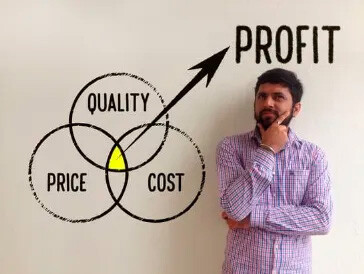As an event or venue business owner, it's essential to continuously evaluate your operations and identify areas where you can improve. By addressing your business's pain points, you can enhance performance, increase profitability, and better meet the needs of your clients.
This article will explore key strategies for:
- Identifying pain points and pressing issues
- Evaluating business performance via metrics and KPIs
- Improving business ROI
- Reducing business costs without compromising quality
- Improving sustainability
- Optimizing staffing and volunteer management
- Expanding your event business into new markets
Identifying pain points
The first step in improving your event or venue business: identifying your pain points.
Conducting customer surveys to gather feedback is a proven method for identifying areas for improvement in your event business.
By sending out surveys to your clients and attendees, you can assess their experiences, satisfaction levels, and preferences. Ask questions about their overall experience with your business or an individual event, specific aspects of your services, and any suggestions for improvement. You just might spot some recurring issues, and you’ll definitely gain an understanding of customer pain points that can inform decisions about how to enhance your offerings.
Another proven method of uncovering areas of weakness is to analyze your business data! By reviewing your business metrics like revenue, attendance (for ticketed events), customer satisfaction ratings, and operational costs, you can identify trends and patterns that may indicate areas for improvement.
Notice a decline in customer satisfaction? Dive deeper to investigate the underlying causes and take corrective action. And don’t forget about measuring the effectiveness of your marketing campaigns, pricing strategies, and operational changes.
And always, always, always seek feedback from employees. Your team members are on the front lines of your business and have a unique perspective on its operations and challenges.
By asking your staff for their insights, you can pretty easily determine where processes can be streamlined, communication can be improved, or resources can be allocated more effectively. Plus, this can help you build a positive and engaged workplace culture.
Metrics to evaluate business performance
To effectively evaluate your business performance over time, it's crucial to track key metrics. Here are a few that you might have heard of (and a couple more that might be a surprise).
Revenue and profitability are key indicators of your business's financial health, and you should regularly be looking for areas where you can increase revenue or reduce costs.
If you ever notice a marked decline or increase in revenue, it’s good business to investigate the underlying causes (positive or negative). Did you have pricing issues or operational inefficiencies? Or is a new seasonal package driving up your ROI? Conversely, if you see an increase in costs, analyze your expenses to identify areas where you can cut back or negotiate better deals with suppliers.
Attendee engagement is another important metric to track, especially if you manage ticketed events. By measuring attendee engagement through surveys, social media monitoring, or on-site observations, you can assess the quality of your events as a whole and identify areas where you can optimize the experience.
If you want to improve levels of engagement, consider things like adding more interactive elements to your events, providing a wider variety of food and beverage options, or improving the overall atmosphere.
Operational efficiency is crucial for the long-term sustainability of your event or venue business. It’s one of the most common areas where business owners can cut costs by streamlining processes.
This might involve automating tasks, improving communication, or optimizing resource allocation. Any area where you can increase productivity or reduce waste is worth your time to investigate.
Customer acquisition is a key metric for measuring the effectiveness of your event business marketing and sales efforts.
Any business owner needs to know how effective their marketing campaigns are in terms of attracting new clients. Monitor this to be aware of any fluctuations and ensure that your marketing efforts are successful in reaching your target audience and converting them into paying customers.
Once those prospects reach out, it’s vital that you have a solid understanding of what your sales team is doing to close the business and their effectiveness at doing it. This means you should keep an eye on sales close rates, won/lost ratios and revenue per sale.
Customer retention helps you gauge customer satisfaction and loyalty with your event business. You want to be absolutely, unequivocally sure that your clients are happy with your services and are likely to continue doing business with you. It’s essential to build profitability over time.
Net promoter score (NPS) is a customer satisfaction metric that measures how likely customers are to recommend your business to others. This is calculated by asking customers to rate your business on a scale of 0 to 10 on how likely they are to refer a friend or colleague to you (where 0 is extremely unlikely and 10 is extremely likely).
Customers who rate your business 9 or 10 are considered promoters, while those who rate it 0 to 6 are considered detractors. The NPS is calculated by subtracting the percentage of detractors from the percentage of promoters. This is a standard metric that some new customers look for when evaluating whether to invest in your services or not.

Improving business return on investment (ROI)
Optimizing your pricing is critical for maximizing your business revenue and profitability. You’ll want to ensure that your pricing is competitive by researching the rates of similar businesses in your area and understanding the market demand for your specific services.
Beyond that,make sure that your pricing reflects the overall value you provide to your clients. If you offer white glove services or unique features, you can probably find a way to justify higher prices.
Explore opportunities to generate additional revenue by offering add-on services and packages like catering, florals, or rental equipment. It might also be worth forming new referrl partnerships with other businesses and vendors to cross-promote your services or offer joint packages. Here are few ideas:
- Upselling and cross-selling: Offer additional products and services to your clients to increase revenue per booking.
- Package deals: Create package deals and bundles to offer discounts to clients who book multiple services.
- Seasonal pricing: Adjust your pricing based on seasonal demand to maximize revenue.
Keep in mind that increasing profitability is also about reducing costs. Make the effort to identify areas where you can cut costs without compromising quality, such as negotiating better deals with suppliers, streamlining operations, or reducing waste. For example, you might be able to negotiate lower prices with suppliers by purchasing in bulk or consolidating your orders.
Reducing business costs without compromising quality
Yes, it really is possible to reduce your business costs without compromising quality! We have a few ideas about how you can do this.
Negotiate better deals with your suppliers and vendors. Building strong relationships with these businesses can lead to better deals and more favorable terms for you.
Don't be afraid to discuss lower prices, longer payment terms, or additional benefits. And by comparison shopping and leveraging your purchasing power, you can often secure significant savings for your event business.
Outsource non-core functions to save time and money. Consider outsourcing tasks that are not essential to the core of your event business, such as accounting or marketing.
If you can outsource these functions, you can free up a ton of time and resources to focus on your core competencies. Outsourcing can also help you access specialized expertise and potentially reduce costs.
Automate repetitive tasks to increase efficiency and reduce costs. Many tasks in your business can be automated, such as data entry, scheduling, and invoicing. If you don’t need to do those things manually, you can save time, reduce errors, reduce labor costs, and improve overall efficiency.
Planning Pod’s automated workflows and task management toolkit are tailored to the needs of busy event professionals like you.

Strategies to improve sustainability in your event business
It’s no secret that environmental sustainability is becoming increasingly important to consumers…which means it should be increasingly important to event businesses.
By reducing your business's environmental impact, you can contribute to a healthier planet and improve your brand's reputation. Some sustainable practices you can implement include:
- Creating efficiencies around cost of goods sold: Purchasing too much food, too many rentals or too many additional resources for events that go unused drives down your margins. So track how much you waste and you may be able to reduce how much you spend per person or per event.
- Reducing waste: Implement recycling and composting programs to reduce your business's waste output.
- Conserving energy: Use energy-efficient equipment, reduce your business's energy consumption, and explore renewable energy options.
- Reducing water consumption: Implement water-saving measures, such as installing low-flow fixtures and fixing leaks.
- Sourcing sustainably: Choose suppliers who prioritize sustainability in their operations.
Optimizing staffing and volunteer management
Hiring the right people is critical to building a successful event or venue business. When hiring staff, focus on finding individuals who are qualified, experienced, and passionate about your business. Look for candidates who have the necessary skills and knowledge to perform their job duties effectively, and who are motivated to contribute to business success.
It’s also important to provide training and development opportunities to help your staff improve their skills. Investing in your employees' professional development can lead to increased job satisfaction, improved performance, and reduced turnover. Offer training programs on relevant topics, such as customer service, event planning, or technology. And consider providing opportunities for your staff (and yourself) to attend industry conferences or workshops.
And if your organization relies on volunteers, develop effective systems for recruiting, training, and managing them. Set clear expectations for volunteers and provide them with the resources and support they need to perform their roles effectively. If you manage your volunteers well, you can successfully leverage their skills and enthusiasm to help your business achieve its goals.
Expanding your event business into new markets
If you’re looking to expand your event or venue business into new markets or segments, here are a few strategies to help.
First and foremost, you need to conduct market research to identify new opportunities and gain a thorough understanding of the needs of your target audience.
This is a critical first step in obtaining valuable insights into emerging trends and identifying potential new markets for your business. This information can also help you tailor your offerings and marketing efforts to better meet the needs of your current customer base.
Once you’ve done your research, think about partnering with other businesses to reach those new customers and expand your offerings. If you haven’t done it already, forming partnerships with complementary businesses can help you reach a wider audience and offer more comprehensive services to the people you’re serving.
Maybe you partner with a local hotel to offer discounted room rates to attendees of your events. Or, team up with a catering company to offer food and beverage services at competitive prices.
Lastly, consider diversifying your event or venue offerings to attract a wider range of clients. By offering more variety in your services, you can reduce your reliance on a single market segment.







